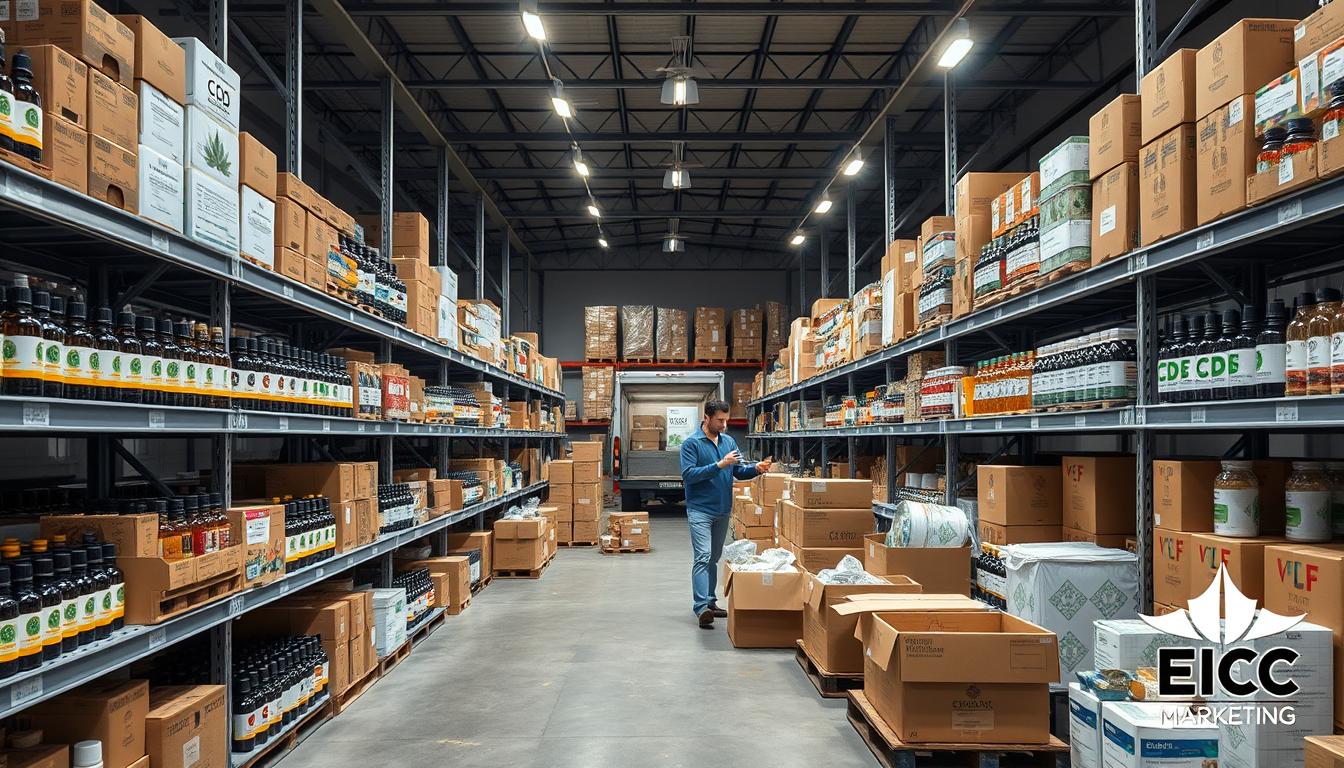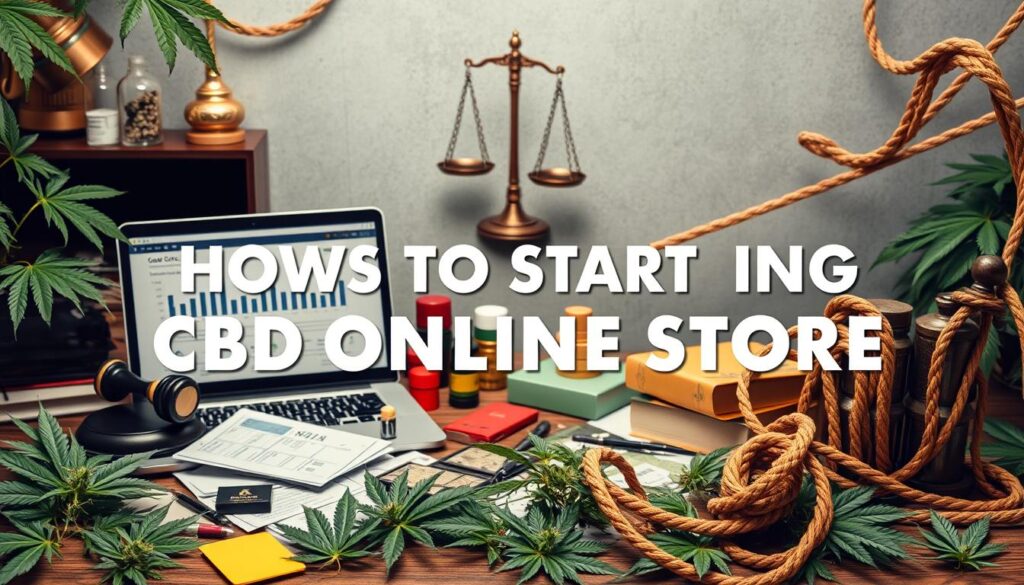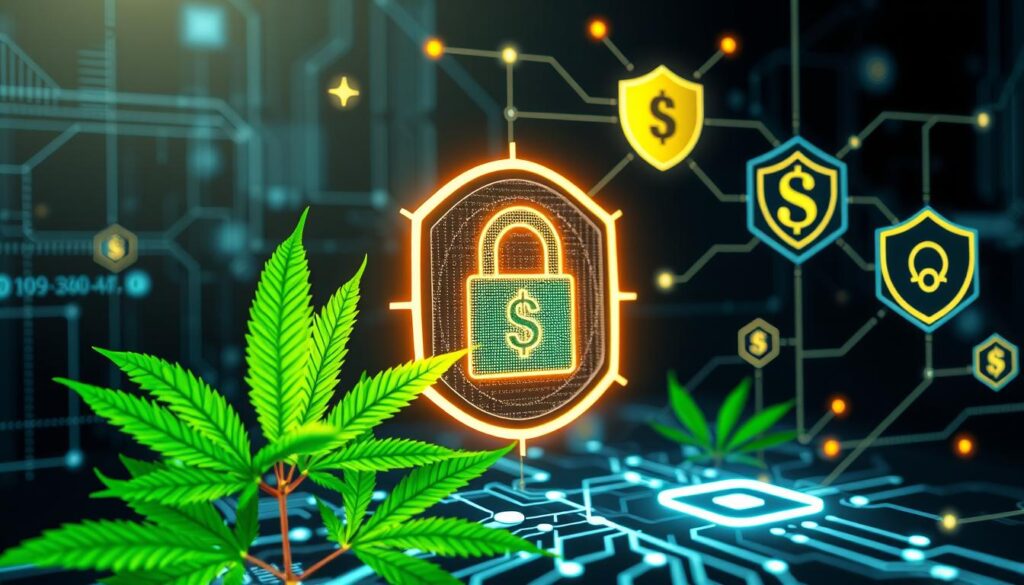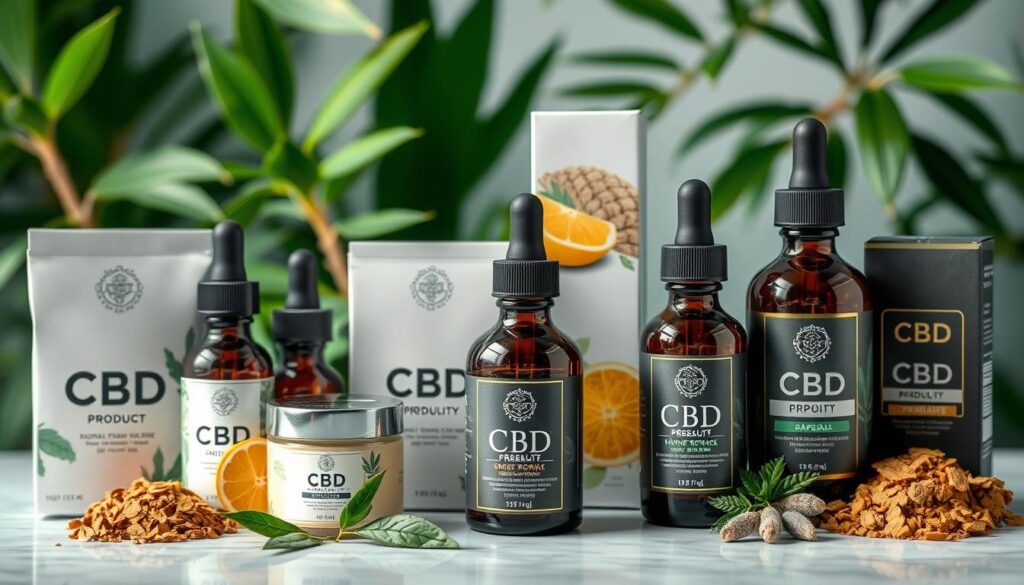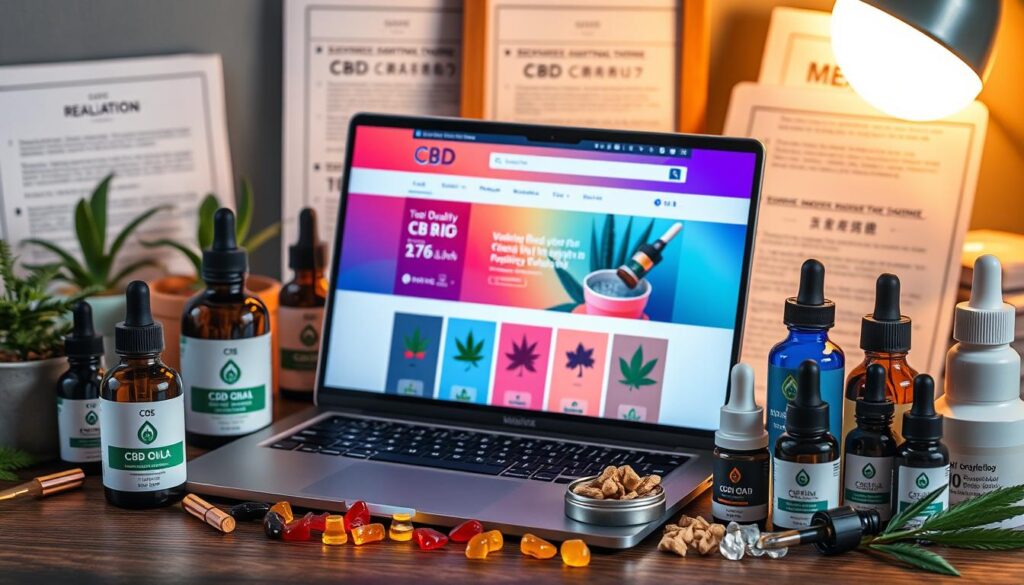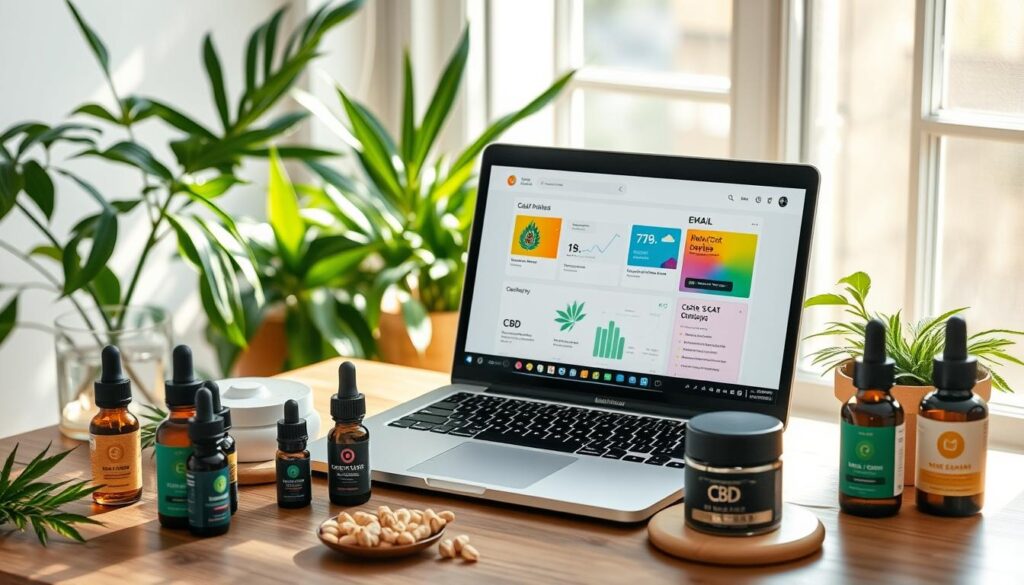What does it take to navigate the intricate maze of shipping CBD products while ensuring full compliance with the law? As the CBD market in the U.S. is projected to soar to $20 billion by 2024, understanding the dynamics of CBD distribution and CBD e-commerce fulfillment becomes critically important.
The 2018 Farm Bill legalized hemp production at the federal level. It allows the shipment of hemp-derived CBD products with THC levels not exceeding 0.3%. However, the complex legal landscape varies by state, presenting challenges for CBD supply chain management. In some states, CBD products must contain zero THC, while others permit up to 0.3% THC. This necessitates strict compliance and thorough knowledge of state-specific laws and carrier regulations.
Moreover, the evolving nature of the CBD industry demands that businesses stay ahead of regulatory changes. With more than a quarter of Americans having tried CBD products, and one out of seven using CBD daily, the demand is clear. Ensuring consistent CBD order processing and robust CBD inventory management practices are vital to meeting this demand.
Top shipping carriers like USPS, UPS, and DHL each have their own guidelines for handling CBD shipments. It’s essential for businesses to be well-informed and meticulously organized. Whether you are shipping within the United States or internationally, adhering to stringent guidelines is key to maintaining compliance and avoiding legal pitfalls.
As we delve into the challenges and best practices for CBD shipping, remember that specialized fulfillment partners such as Red Stag Fulfillment can offer invaluable expertise. From federal and state laws to carrier-specific regulations, the strategy you employ can make or break your success in this burgeoning market. For those looking to thrive in the CBD sector, it pays to understand every nuance of the process.
Understanding the Legal Landscape for CBD Products
The CBD market has grown fast, with sales reaching $4.6 billion in 2020. It’s expected to hit $12.64 billion by 2026. As more businesses enter this market, knowing the laws is key. Laws vary at the federal, state, and international levels, making things complex.
Federal Regulations
The 2018 Hemp Farming Act made hemp-derived CBD legal if it has less than 0.3% THC. This law helps businesses grow in the U.S. But, following federal rules is a must and the FDA watches closely.
It’s important to focus on safety and quality. Products must be accurately labeled and tested by third parties. For more on these rules, check out our guide on CBD legal considerations.
State-Specific Laws
Even though the federal government allows CBD, state laws differ. Some states allow up to 0.3% THC, while others have strict rules. E-commerce businesses need to know each state’s laws to operate well.
In states like California and Colorado, CBD is widely accepted. But, places like Idaho have strict rules. Businesses must be ready to change their strategies as laws change.
International Shipping
Shipping CBD internationally is tricky because laws vary worldwide. What’s legal in one country might be banned in another. For example, the U.S. allows CBD shipments, but Canada has strict rules.
Businesses shipping internationally must research the laws of the country they’re sending to. Not following these laws can lead to big problems.
The table below shows how different countries view CBD:
| Country | Legal Status | Max THC Content |
|---|---|---|
| United States | Legal (under 2018 Farm Bill) | 0.3% |
| Canada | Legal (domestic use only) | 0.3% |
| United Kingdom | Legal | 0.2% |
| Australia | Legal with prescription | 0.0% |
By staying updated on laws, e-commerce businesses can succeed in the CBD market. Understanding the rules and getting legal advice is crucial as the market grows.
Carrier Regulations for CBD Shipping
Shipping CBD products needs careful attention to carrier rules. As CBD’s popularity grows, so do shipping policies. Here’s a look at how major carriers handle CBD shipping.
USPS Guidelines
The USPS CBD policy lets you mail hemp-derived CBD products under certain conditions. The product must have no more than 0.3% THC. Also, you must follow federal, state, and local hemp laws.
You need a signed statement saying the CBD is legal. You must also keep records for at least three years.
UPS Guidelines
For UPS CBD delivery, the rules are strict. UPS allows hemp products that follow federal law. You must provide detailed info on the product’s origin and processing.
But, they don’t ship liquid hemp for vaping or from places linked to marijuana. Keep compliance records for two years.
FedEx Guidelines
The FedEx CBD regulations have changed, allowing hemp-derived CBD with less than 0.3% THC. But, they still ban marijuana and unrefined hemp. Exceptions might be granted after approval.
This ensures all items meet strict criteria for compliance.
Working with DHL
DHL CBD guidelines require following federal, state, and local laws. Make sure THC is under 0.3%. DHL doesn’t ask for documents at shipping but emphasizes keeping records.
This flexibility helps businesses streamline their shipping while staying legal.
Understanding each CBD shipping carrier‘s rules is complex. But, knowing these regulations helps avoid risks and ensures smooth operations in this fast-growing market.
Ensuring Compliance in CBD Fulfillment
Ensuring compliance in CBD fulfillment is key for businesses in this growing market. Companies must follow federal and state rules, carrier needs, and keep proper records. Using third-party logistics providers helps manage CBD product handling.
Businesses must follow the rule that CBD products have less than 0.3% THC. This is crucial for shipping CBD across states under the 2018 Farm Bill. They also need licenses for industrial hemp production and regular lab tests for THC content. Keeping records for two years is a must for carriers.
Choosing logistics partners familiar with CBD ensures correct handling and shipping. Companies like Fulfyld offer secure CBD warehousing, reliable shipping, and inventory management. This lets businesses grow without worrying about logistics details.
It’s also vital to know about state and local laws that might add extra rules. Working with experts who understand CBD regulations is very helpful.
Choosing the right CBD third-party logistics partner is crucial. They should handle tasks like kitting, packaging, and storage. Proper storage is key for CBD products, keeping them effective for a year or more.
Lastly, following carrier guidelines is essential. UPS, FedEx, and USPS have specific rules, like not shipping vaping products. Staying compliant with these rules avoids legal issues and ensures smooth delivery.
Best Practices for CBD Shipping and Fulfillment
The CBD and hemp industry is growing fast, valued at about 3.5 billion dollars. It’s expected to hit 13.4 billion dollars by the end of the decade. To keep up, companies must focus on detailed documentation, third-party testing, and careful storage and packaging. These steps help ensure quality and follow the rules.
Documentation and Labeling
It’s key to label CBD products correctly. They need to show what’s inside and how much. This helps with checks and builds trust with customers. Each package should have info on where it came from, THC levels (under 0.3%), and follow the 2018 Farm Bill. USPS needs a lab report showing THC levels.
Third-Party Testing
Third-party testing is vital for quality. It checks THC levels and follows rules. This testing proves the product’s makeup, avoiding mistakes or contamination. Companies must keep these records for two years to stay accountable.
Storage and Packaging
Storing CBD products right is important because they’re sensitive. Keeping them in cool, controlled places helps. Also, using sealed and tamper-proof containers protects them during shipping. This keeps the product fresh for the customer.
| Logistics Provider | CBD Shipping Policy |
|---|---|
| USPS | Allows shipping of legal hemp-based CBD with THC concentration lab report |
| UPS | Allows CBD shipping with manufacturing details and origin disclosure |
| FedEx | Bans shipping all hemp and CBD products |
| DHL | Bans shipping all hemp and CBD products |
Following these best practices is key for staying in line with rules, ensuring quality, and keeping customers happy. By focusing on the right documentation, testing, and storage, we can meet the industry’s needs while keeping standards high.
Choosing the Right Fulfillment Partner for Your CBD Business
Finding the right fulfillment partner is key to your CBD business’s success. The CBD market is expected to grow from half a billion dollars in 2018 to $16 billion by 2025. It’s important to know what makes a good partner. Look for industry expertise, a compliance record, and flexibility in storage and distribution when choosing CBD logistics partner.
What to Look For
When looking at CBD fulfillment solutions, find a partner with CBD logistics experience. They should have a track record of reliable compliance, especially with the 2018 Farm Bill. This bill allows shipping of CBD products with less than 0.3% THC across state lines.
“Nature’s Ultra saw a 9,900% growth year-over-year after partnering with ShipBob, illustrating the benefits of aligning with a proficient fulfillment partner. ShipBob’s technology secures the best shipping rates and offers 2-Day Express Shipping to all 50 states, making it a prime example of efficiency.”
ShipBob also reduces shipping costs by using multiple centers and offering branded packaging. This ensures fast and affordable services without sacrificing quality. In states like Colorado and California, a local fulfillment partner is very valuable.
Benefits of Third-Party Logistics
Using CBD third-party fulfillment benefits can save your business money and time. Third-party logistics (3PL) providers offer several advantages, including:
- Regulatory insights: 3PL partners know the latest CBD regulations, ensuring you comply.
- Cost savings: They use multiple centers and get the best shipping rates, saving you money.
- Operational efficiency: They handle order management, inventory, and packaging, making your business run smoother.
- Market adaptability: 3PL providers can quickly adjust to market changes, keeping you competitive.
For example, ShipBob helped a health and wellness brand grow from $70,000 in 2018 to over $7 million. As the CBD industry grows, especially among Millennials, reliable logistics are more important than ever.
A good fulfillment partner can make your supply chain more efficient. They also help you reach new markets and follow laws. When choosing CBD logistics partner, make sure they match your business goals and offer the flexibility needed in this fast-changing market.
CBD Shipping and Fulfillment Challenges and How to Overcome Them
Dealing with CBD shipping challenges can be tough due to strict rules. CBD products from hemp must have less than 0.03% THC to ship legally. This means they need to pass third-party tests to show their THC levels. Not following these rules can lead to big fines or even stopping shipments.
There’s also a big issue with different laws in states and countries. The 2018 Farm Bill made hemp legal in the U.S., but each state has its own rules. Only 15 states allow using CBD from marijuana plants for fun. Using services like Shipfusion can help deal with these rules.
Seasonal changes also add to the challenges of shipping CBD. Demand can go up and down, so managing stock is key. Using data to predict sales can help adjust stock levels. Also, using tech like order systems and automated shipping can make things smoother. Keeping good relationships with suppliers is also important to keep quality high and customers happy.
To beat CBD shipping problems, you need a smart plan. This plan should keep up with changing laws and use the best ways to ship. Working well with reliable partners and using new tech can help. This way, businesses can stay on top in the growing CBD market.
